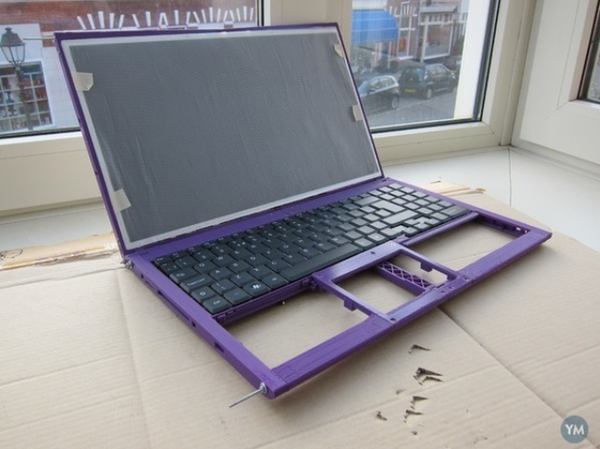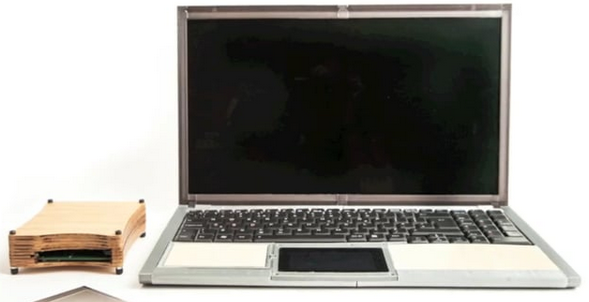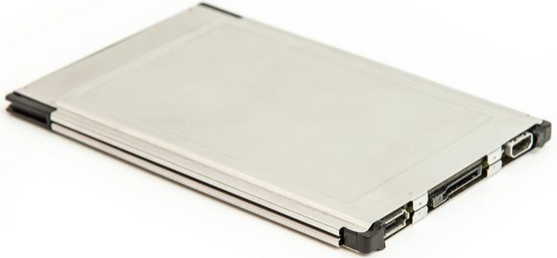A Free Laptop Project
EOMA68 Laptop
ByA campaign to redefine free software and hardware
The Four Freedoms have been central to free software for years. Now, Luke Leighton is offering additional concerns in a crowdfunding campaign to build the EOMA68, a free laptop that is also environmentally responsible and security-conscious and that, if successful, could help to establish open hardware as a presence in manufacturing.
Leighton is a long-time contributor to free software (or, as he prefers to call it, Software Libre), having contributed his first patches for Samba functions in 1992. As a result of his experience, he realized that one of the key disadvantages of free software has always been that those who build it often benefit the least. He compares his own experience of having to work on construction sites at one point in his career to the discovery in 2014 of security vulnerabilities in OpenSSH and other major applications because of a lack of funding for sufficient developers.
At the same time, he became aware that companies like Google have regularly taken advantage of free software and relicensing its work under BSD-style licenses without contributing their work back to the Linux kernel. His conclusion is that “even companies that tell us that they’re doing us a favor by working with open source are not really interested in acting in an ethical or responsible fashion.”
Realizing that complaining about these problems accomplished nothing, Leighton resolved to develop ethical, privacy-respecting hardware. “From there,” he says, “I would be able to set up an ethical business fund that gave something back to the actual people who had made the business successful – and ultimately do things like fund the creation of a useful and powerful privacy-respecting processor.”
The result was the EOMA68 Standard (Figure 1), which first made the news as a result of Leighton’s collaboration in 2013-2014 with Aaron Seigo to build Vivaldi, an attempt to build a free tablet, and the Improv development board that was intended to help jump-start free-licensed hardware. Neither succeeded, apparently as a result of inexperience and miscommunication, and the setbacks that trouble most first efforts to product hardware.
 Figure 1: An early version of the EOMA68 laptop showing 3D-printed parts. (Image courtesy of the EOMA68 project)
Figure 1: An early version of the EOMA68 laptop showing 3D-printed parts. (Image courtesy of the EOMA68 project)
From this experience, Leighton says that he has learned that keeping control of product design, specifications, and production is essential. He is also determined not to deal with venture capital and convinced that running an ethical business by dealing with unethical ones “is not going to work.” at the same time, he retains some of the manufacturing contacts that will be needed to bring a new product to market
A New Breed of Laptop
Looking back on Vivaldi and Improv, Leighton concludes that their failure may have been just as well, because, two years ago, the EOMA68 Standard was not ready for large-scale production.
Today, building on the lessons learned from past experience, Leighton is planning to build a 15.6-inch laptop with a casing made of bamboo, wood, and parts created with a 3D printer whose specifications are available (Figure 2). The case includes peripherals such as the screen, keyboard, trackpad, and WiFi and is completed by a computer card housed in recycled PCMCIA cases that slot into the case (Figure 3). This arrangement makes the laptop environmentally friendly and easy to repair or upgrade.
 Figure 2: The EOMA68 laptop. Notice the bamboo frame around the screen and the home-made housing for the computer card. (Image courtesy of the EOMA68 project)
Figure 2: The EOMA68 laptop. Notice the bamboo frame around the screen and the home-made housing for the computer card. (Image courtesy of the EOMA68 project)
In fact, Leighton expects users will do many of the repairs themselves using parts from doll houses, radio-control models, and lumberyards, rather than depending on vendors for parts. This expectation began at a time when Leighton needed a simple replacement on a prototype’s case and realized that plywood was more economical than “wast[ing] my time and perfectly good plastic to print out a damn rectangle. … It wasn’t until afterwards that I retrospectively added the whole eco thing on top, but it’s pretty ironic that this was driven by my laziness and cost-cutting.”
 Figure 3: Computer cards slide into the rest of the laptop, allowing quick changes of operating systems. They are housed in recycled PCMCIA cards. (Image courtesy of the EOMA68 project)
Figure 3: Computer cards slide into the rest of the laptop, allowing quick changes of operating systems. They are housed in recycled PCMCIA cards. (Image courtesy of the EOMA68 project)
To help make the case module self-repairable, the 3D-printed parts are broken down into 35 separate pieces so that damage to one piece does not require the reprinting of the entire case, as it does with the pi-top, a Raspberry Pi-based laptop that also allows the printing of replacement parts.
Initially, the computer cards will be loaded with a free-licensed bootloader and provide either Parabola GNU/Linux-libre or Debian GNU/Linux as the operating system. Both will use a GNU Linux-libre kernel, a version of the Linux kernel with all the proprietary blobs removed, an Allwinner A20 dual-core processor, 2GB of RAM, and 8GB of NAND flash.
Parabola is used in the hopes of the laptop receiving Respect Your Freedom certification from the Free Software Foundation, since it is one of the few completely free distributions for ARM processors. Debian is likely to be more popular, but it is technically non-free because it allows easy access to non-free software. To make the two easily distinguishable, the Parabola version is called the Libre Tea Computer Card, and the Debian version the Practically Perfect.
If produced, the EOMA68 laptop will be among the first laptops with a free license for everything from the bootloader to the operating system. It will be modular, allowing for easy upgrades and repairs; economical, because parts can be replaced rather than the entire computer; and ecologically responsible, using some recycled parts and giving much of the device a lifetime greater than the three to five years of comparable laptops.
Challenges and Definitions
The EOMA68 standard has the potential to redefine the definition of free software, linking it to environmentalism and privacy concerns in a way that the Free Software Foundation has attempted for more than a decade. Moreover, with even limited success, it could help ease the way for other free hardware devices.
However, the obstacles in its way remain formidable. For one thing, its specifications are mediocre at best, which may be why, after two weeks of the fundraising campaign, it has reached less than 20 percent of its goal of $150,000.
Another concern is whether Leighton’s past efforts will handicap this current effort. The Vivaldi-Improv efforts failed to reach the required levels for manufacturing, which may have destroyed the project’s reputation. Moreover, these previous efforts were dealing with quantities of fewer than 2,500 units and could have typecast the project as a small-time effort that is unlikely to scale to anything like the massive orders made by major computer vendors.
Granted, Leighton is aware of these potential problems, noting that working with his past contacts again “will be hard.” However, getting manufacturers to understand the requirements of free software or to take a second chance remain serious difficulties. Even if the EOMA68 laptop is brought to market, that is no guarantee of success, because winning over vendors and customers requires refighting many of the battles with manufacturers all over again.
Still, with luck, Leighton may be able to overcome these difficulties and move on to other products, such as a free tablet or – his own ambition – a Digital SLR camera. His success may depend on how many people can be convinced that the project is “at its heart an ethical initiative to give us our freedom of choice back at the hardware level” and not judge it by specifications alone.
The task is difficult. Yet, as Leighton himself observes, sitting back and complaining will only guarantee that nothing will change. If nothing else, efforts like his may help to expand the free software definition beyond its current limitations.
Subscribe to our Linux Newsletters
Find Linux and Open Source Jobs
Subscribe to our ADMIN Newsletters
Support Our Work
Linux Magazine content is made possible with support from readers like you. Please consider contributing when you’ve found an article to be beneficial.

News
-
Introducing matrixOS, an Immutable Gentoo-Based Linux Distro
It was only a matter of time before a developer decided one of the most challenging Linux distributions needed to be immutable.
-
Chaos Comes to KDE in KaOS
KaOS devs are making a major change to the distribution, and it all comes down to one system.
-
New Linux Botnet Discovered
The SSHStalker botnet uses IRC C2 to control systems via legacy Linux kernel exploits.
-
The Next Linux Kernel Turns 7.0
Linus Torvalds has announced that after Linux kernel 6.19, we'll finally reach the 7.0 iteration stage.
-
Linux From Scratch Drops SysVinit Support
LFS will no longer support SysVinit.
-
LibreOffice 26.2 Now Available
With new features, improvements, and bug fixes, LibreOffice 26.2 delivers a modern, polished office suite without compromise.
-
Linux Kernel Project Releases Project Continuity Document
What happens to Linux when there's no Linus? It's a question many of us have asked over the years, and it seems it's also on the minds of the Linux kernel project.
-
Mecha Systems Introduces Linux Handheld
Mecha Systems has revealed its Mecha Comet, a new handheld computer powered by – you guessed it – Linux.
-
MX Linux 25.1 Features Dual Init System ISO
The latest release of MX Linux caters to lovers of two different init systems and even offers instructions on how to transition.
-
Photoshop on Linux?
A developer has patched Wine so that it'll run specific versions of Photoshop that depend on Adobe Creative Cloud.
